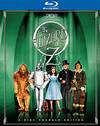





Show Boat (1929/1936/1951)
Awards | Articles | Bibliography | Downloads | Links | Image Credits
| Article 3 - 1929 Film |
Singing and Talking: "Show Boat"by Mordaunt HallNew York Times, April 21, 1929 page 119
A good deal of this production is virtually silent, the subtitles of old being used. The staging is splendid and the glimpse of the show boat, an actual craft of its kind, known here as the Cotton Palace, are pleasing to the eye. Like Mr. Ziegfeld's stage contribution they give one an idea of chances for a quiet, comfortable life aboard the boat, until that harsh person, Parthenia Ann Hawks, the captain's wife, appears upon the scene. The story, however, is frequently maudlin and the agony is prolonged by the director, Harry Pollard, who betrayed a decided penchant for the overdoing of pathos in his pictorial conception of "Uncle Tom's Cabin." The scenes in Chicago, where Magnolia and her husband, Gaylord Ravenal, go after their elopement, are filmed in a ponderous manner. There are the gambling sequences where the weak Ravenal is perceived losing his money, and then there is a spell where the Ravenals, with their child, are shown first in the Sherman House, which gradually dissolves into a comfortless room. The gambling-crazed Ravenal has a stroke of good fortune at the roulette wheel, but he is not cured of the fever, for when he is offered, over the telephone, a trotting horse for a mere $5,000, he at once seizes upon the bargain and takes up racing. The racing scene is full of life, but other episodes are often tiresome, especially those wherein Ravenal returns intoxicated, with money he has borrowed from Julie. Joseph Schildkraut is handsome, but his antics as the inebriated Ravenal are absurd and the footage given over to this is much too long. Ravenal has a jocose jag and he laughs until it becomes irritating. Although Laura La Plante as Magnolia "can't help lovin' that man," one rather wishes she would bolt with the $2,000 her husband has brought home just to teach him a lesson. Magnolia assuredly is a long-suffering wife, but in the end she goes on the stage, sings the songs she sang on the old show boat and becomes most successful. But still loving "that man." Fortunately for the picture, it ends with a series of captivating melodies, which result in one leaving the theatre pardoning some of the boring periods. © 1929 The New York Times |
|
Return to the Articles Index. Return to the SHOW BOAT main page. |
| Now in Print! |
|---|
| Now on DVD! |
|---|
Buy Videos & DVDs |
|
Buy Movie Posters |
|
Buy Movie Posters |
|
Classic
Movie Merchandise |
|
![]() Printer-friendly version.
Printer-friendly version.
![]() Return
to the top.
Return
to the top.
Last updated:
June 21, 2010.
Reel Classics is a registered trademark of Reel Classics, L.L.C.
© 1997-2010 Reel Classics, L.L.C. All rights reserved. No
copyright is claimed on non-original or licensed material.
Terms of
Use.









